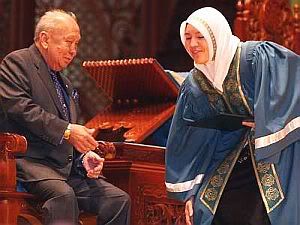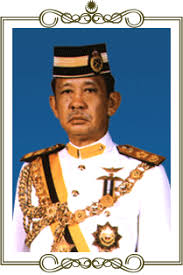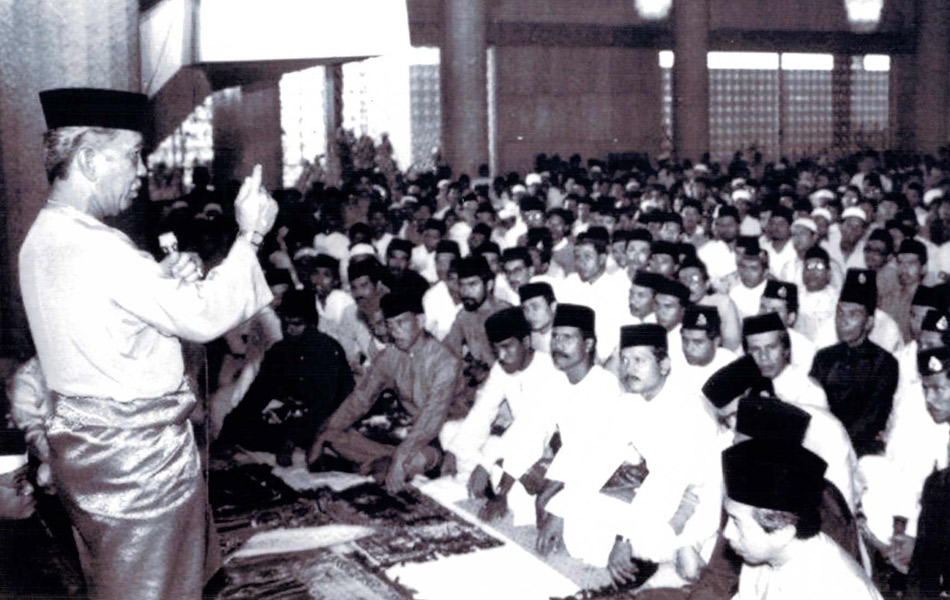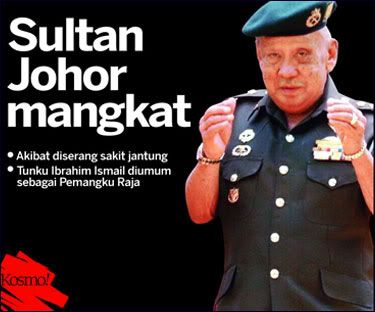
SULTAN JOHOR MODEN
KE 4
ALMUTAWAKIL ALALLAH
SULTAN ISKANDAR ALHAJ
(1981 - 2010)

DYMM Almutawakkil Alallah Sultan Mahmud Iskandar Alhaj ibni almarhum Sultan Ismail DK SPMJ SPDK DK(Brunei) SSIJ PIS BSI
Almarhum Sultan Mahmood Iskandar diputerakan di Istana
Semayun, Johor Bahru pada 8 April 1932. Ayahandanya ialah almarhum Sultan Sir
Ismail (al Khalidi) ibni almarhum Sultan Sir Ibrahim (al Masyhur) ibni almarhum
Sultan Sir Abu Bakar ibni almarhum Temenggung Tun Ibrahim ibni almarhum
Temenggung Daing Abd Rahman (merupakan keturunan Bugis dari Pulau Sulawesi,
Indonesia). Bondanya ialah almarhumah Sultanah Tunku Aminah binti Tunku Abdul
Majid.
Baginda mendapat pendidikan di Sultan Abu Bakar English College, Johor
Bahru, Trinity Grammar School, Sydney Australia dan South Devon Technical
College, Torquay, UK. ik oleh ayahandanya menjadi Tunku Mahkota Johor pada 8
Mei 1959 tetapi dilucutkan dari jawatan tersebut pada 10 Ogos 1961 dan
digantikan oleh adindanya Tunku Abdul Rahman. Pada 1 Dis 1966 baginda diberikan gelaran Raja Muda
Johor. Baginda telah dilantik semula menjadi Tunku Mahkota Johor pada 29 April
1981. Apabila ayahandanya mangkat pada 11 Mei 1981 Tunku Mahmood Iskandar telah
dilantik dan dimasyhurkan sebagai Sultan Johor.


In 1956 : ALMARHUM Sultan (extreme left) with his father then Tunku Mahkota Ismail (extreme right) and his mother (4 from left) , brother (Tengku Abd Rahman) and sister (Tengku Maimunah)
Sultan Iskandar merupakan Sultan Johor yang pertama
dilantik menjadi Yang DiPertuan Agong. Nenda dan ayahanda baginda telah menolak
untuk dilantik menjadi Yang Di Pertuan Agong apabila sampai giliran baginda
berdua. Sultan Iskandar adalah Sultan
Johor pertama menerima perlantikan sebagai Yang Di Pertuan Agong Malaysia yang
ke 8 pada 26 April 1984 dan ditabalkan di Istana Negara, Kuala Lumpur pada 15
November 1984.
Semasa baginda bertahta di Istana Negara, pemerintahan
Negeri Johor telah dipangku oleh DYTM Tunku Mahkota Johor, Tunku Ibrahim Ismail
ibni Sultan Iskandar. Baginda menamatkan tugas sebagai SPB YDPA pada 25 April
1989 dan kembali memerintah Negeri Johor.
Baginda berkahwin kali pertama pada 5 Januari 1956 dengan
Puan Kalsom binti Abdullah @ Josephine Ruby Treverrow (dilahirkan di England pada
2 Dis 1935- kemudiannya bergelah Che Puan Besar) tetapi kemudiannya berpisah
pada bulan Oktober 1962.

Che Puan Kalsom binti Abdullah @ Joshepine Ruby Treverrow

Che Puan Besar Hajjah Kalsom (semasa pengkebumian alMarhum
Sultan Iskandar)
Perkahwinan Baginda dengan Che Puan Kalsom dikurnai dengan
seorang putera dan tiga puteri, iaitu:
(1) Tunku Hajjah Kamariah Aminah Maimunah Iskandariah binti
almarhum Sultan Iskandar al-Haj, Tengku Puan Panglima di-Raja (diputerikan pada
11 Julai 1956) dan berkahwin dengan Tengku Sulaiman Shah al-Haj ibni almarhum
Sultan Salahuddin Abdul Aziz Shah al-Haj, Tengku Panglima di-Raja Selangor.

Tunku Kamariah Aminah Maimunah Iskandariah
(2) Tunku Hajjah Zabedah Aminah Maimunah Iskandariah binti
almarhum Sultan Iskandar al-Haj (diputerikan pada 20 Oct 1957), Tengku Besar.

Tunku Besar Hajjah Zabedah

Tunku Besar Hajjah Zabedah
(3) Tunku Ibrahim Ismail, DK, SPMJ, SPDK (diputerakan pada 22
Nov 1958. Kemudiann berkahwin pada 22 Sept 1982 dengan Raja Zarith Sofiah binti
al-Marhum Sultan Idris al-Mutawakil Allah Afifullah Shah. Tunku Ibrahim
kemudiannya dilantik menjadi Sultan Johor pada 23 Jan 2010.
Tunku Ibrahim Ismail
(4) Tunku Hajjah Azizah Aminah Maimunah Iskandariah binti
almarhum Sultan Iskandar al-Haj, Tengku Puan Pahang (1986) diputerikan pada 5
Ogos 1960). Tunku Azizah berkahwin pada 6 Mac 1986 dengan Tengku Abdullah ibni
Sultan Haji Ahmad Shah al-Mustain Billah, Tengku Mahkota Pahang.
Tunku Azizah Aminah, Tengku Ampuan Besar Pahang
Sultan Iskandar berkahwin kali kedua pada 20 Ogos 1961 dengan Tengku Hajjah Zanariah binti Tengku Ahmad (Sultanah Zanariah) (diputerikan di Pasir Mas, Kelantan pada 5 Julai 1940).
Perkahwinan baginda dengan Sultanah Zanariah telah
dikurniakan dengan seorang putera dan lima orang puteri:
Tunku Mariam Zaharah binti almarhum Sultan Iskandar Alhaj
(diputerikan pada 4 Sep 1962) – berkahwin pada tahun 1999 dengan Tengku Ahmad
Zainul Abidin bin Tengku Muhammad Zaid (berpisah). Dikurniakan seorang putri:
Tengku Sofiyya binti Tengku Ahmad Zainul Abidin


Tunku Norani Fatimah
binti almarhum Sultan Iskandar Alhaj
diputerikan pada 17 Jul 1963) dan berkahwin dengan Encik Ramlan bin
Dato’ Harun Idris pada tahun 2000.
Tunku Maimunah Ismailiah
binti almarhum Sultan Iskandar Alhaj
diputerikan pada 20 Okt 1967 dan berkahwin dengan Dato’ Mahzan bin Dato'
Yahya DPMJ pada tahun 2004. Dikurniakan seorang puteri: Puteri Wan Mahzanah Huriyyah binti Dato' Mahzan
Tunku Abdul Majid Idris Ismail Ibrahim binti almarhum Sultan Iskandar Alhaj DK, SPMJ, SMJ. Tunku Bendahara. (diputerakan pada 20 Jul 1970. Berkahwin pada 13 Jan 2005 dengan Tunku Teh Mazni binti Tunku Yusuf (dilahirkan pada 2 April 1976 di Kedah. Dikurniakan seorang putera dan seorang puteri:
(1) Tunku Mahmud Iskandar
(2) Tunku Aisyah Menjalara Iskandar


Tunku Bendahara Johor, Tunku Abdul Majid Idris, isteri
Tunku Teh Mazni dan dua anakanda mereka
Tunku Muna Najihah
binti almarhum Sultan Iskandar Alhaj
diputerikan pada 12 Apr 1973 dan berkahwin dengan Kdr Shaftdean Lufty
bin Rusland psc TLDM. Dikurniakan 2 orang putera dan 3 orang puteri:
(1) Putra Wan Iskandar Abdul Rahman Uwais Sirahuddin (2002)
(2) Putri Wan Zanariah Imanina Munawarah Nora Iskandariah
(2004)
(3) Putra Wan Muhammad Umayr Sharafuddin bin Shaftdean (2007)
(4) Putri Wan Najiah Umayra Munawarah (2007)
Tunku Muna Najihah
Tunku Aminah Kalsom Masera Mariam Zahirah Iskandariah binti almarhum Sultan Iskandar Alhaj diputerikan pada 6 Jun 1979 adalah graduan
Universiti Islam Antarabangsa, Malaysia (IIUM), Gombak (BA Hons. 2005).

Tunku Masera

sewaktu almarhum menjadi Raja Muda-bersama isteri dan putera-puteri
Elected as 8th YDP Agong
Under the elective monarchy system of Malaysia, Sultan
Iskandar was elected to be the 8th Yang Di-Pertuan Agong on 9 February 1984 by
the council of rulers, shortly before his predecessor's term expired on 26
April 1984. He succeeded the Sultan of Pahang as the Yang-Di Pertuan Agong on
26 April. A royal investure was held shortly after that–in which he was donned
in the traditional suit of the Agong, whereby he was officially installed.
Sultan Iskandar served in the capacity as the Yang-Di Pertuan Agong until 1989,
whereby the Sultan of Perak succeeded him.





On 8 April 2006, the Sultan appointed his grandson Tunku
Ismail Ibrahim, the son of the Tunku Mahkota
as the Raja Muda during an investure in conjunction on his birthday. The
rank of Raja Muda denotes that Tunku Ismail is second in position in terms of
the order of succession to the Johor royal throne.
Controversies
Sultanate Succession. Prior to his life as the Sultan or
Agong, and even during the 1980s and early 1990s, Tunku Mahmud's reputation was
more or less marred by a number of alleged controversial incidents which
received occasional attention from the media. One of these earliest incidents
was the loss of his status as Tunku Mahkota in 1961—a position which his
father, Sultan Ismail, appointed to him two years earlier, citing reasons of
alleged misbehaviour after confidential reports accusing him of incarcerating a
policeman reached the Sultan. Tunku Mahmud's younger brother, Tunku Abdul
Rahman was appointed as the Tunku Mahkota in favour of him.
Nevertheless, in 1966, Tunku Iskandar was appointed the
Raja Muda which puts him second in line to the throne. In April 1981, Tunku
Mahmud was reinstated as Tunku Mahkota shortly before his father's death the
following month and was subsequently installed as the Sultan of Johor, under
the orders of his father.
However, some eyewitnesses challenged the legitimacy of
Tunku Mahmud's reappointment as the Tunku Mahkota, by arguing that they
witnessed Sultan Ismail already having lapsed into coma at the time of his
appointment as the Regent. Records stated that Sultan Ismail lapsed into
comatose on 8 May, three days before his death. Relations with the Menteri
Besar of Johor, Tan Sri Datuk Othman bin Mohd Saat deteriorated when the latter
questioned Tunku Iskandar's legitimacy to the throne, which led to an incident
which saw the Sultan issuing an order to the Menteri Besar to vacate his office
within 24 hours, shortly after Sultan Ismail's death, citing reasons for the
need for that office space for his own. The Menteri Besar heeded his order,
though the Sultan did not move in as he had said. Othman Saat subsequently
resigned the following year as the Menteri Besar. The Sultan also ordered all
the 'honours and awards' given to Othman by the previous Sultan (including
DK(Johor), and all the Datukship to be returned to the government.
Allegations of Criminal Misconduct. In 1972, Tunku Mahmud was charged for causing
assault with a mace to two men for overtaking his car and was convicted the
following year. A year later, reports also surfaced another similar attack upon
a young couple, when Tunku Iskandar, together with his bodyguard, attacked them
with chemicals and a mace after having offended him. Another alleged incident
took place at about this time when Tunku Mahmud chained up two policemen in a
dog kernel for day after having angered him.
Five years later, Tunku Mahmud was charged and convicted of
manslaughter after shooting and killing a man near his private helicopter whom
he took to be a smuggler. In both cases, his father, Sultan Ismail, intervened
and granted official pardons to Tunku Iskandar. Similarly, his eldest son,
Tunku Ibrahim Ismail, was convicted in the 1980s of shooting dead a man in a
nightclub during a feud, but was quickly pardoned.
In 1987, Sultan Iskandar was accused of causing the death
of a golf caddy in Cameron Highlands by assault, following an incident in which
the golf caddy laughed when the Sultan missed a hole. Tunku Abdul Rahman,
Malaysia's first Prime Minister, pointed out that the Sultan (then the Agong)
could not be prosecuted due to the immunity that was accorded to the rulers,
yet he condemned Sultan Iskandar's actions at the same time. In the end the
matter was let off without much public attention. The brother of the caddy–who
also suffered injuries from the incident, being distressed from what he saw,
subsequently ran amok in Kuala Lumpur and had to be quarantined in a mental
hospital. (from WIKIPEDIA)
Political Controversies
Days as the Yang di-Pertuan Agong of Malaysia
(1980s).Shortly before his election as the Yang-Di Pertuan Agong in 1983, a
spate of reports alleging Sultan Iskandar's intention to launch a coup d'état
by launching a state of emergency to overthrow the government circulated within
political circles, which reached Mahathir himself. The Sultan was reportedly
having fostered close relations with several key military personnel, including
the Army chief himself. The government subsequently took action to curb
constitutional loopholes within the constitution and took to task of reducing
the power of royal veto in passing legislation, culminating to a constitutional
crisis in late 1983. Nevertheless, during his inaugural speech as the Agong in
1984, about a month after the constitutional amendments were passed in
parliament, Sultan Iskandar voiced public support for the revised constitution
and pledged to act in accordance to the Prime Minister's advise.
A diplomatic scandal between the United Kingdom and
Malaysia broke out in 1984, when several British newspapers published Sultan
Iskandar's coronation, citing the headlines such as "Killer becomes
King" and "King a Killer", which enraged the Malaysian
government, who demanded an apology from the British government. The British
government refused to apologise on behalf of the newspapers, hence triggering
tensions between the two countries.
Two months later, in June 1984, Sultan Iskandar in his
capacity as the Agong, surprised the Malaysian public when he publicly called
upon the then-Deputy Prime Minister, Musa Hitam, to make a public apology in
front of the entire congregation present at the National Mosque. Sultan
Iskandar, on his part, was angry over remarks which Musa made during the course
of the 1983 constitutional crisis that he deemed as disrespectful. Musa abided
to the Agong's demand and boldly came forward to make the apology, which was
greeted by a thunderous applause from the entire congregation. The event, which
was broadcasted live throughout on the Malaysian Radio (although the television
stations abruptly terminated its broadcast halfway), was seen by many observers
as an act of confrontation by the Agong to put Musa in his place.
In 1988, also serving in his capacity as the Yang-Di
Pertuan Agong, the Lord President of the Federal Court Tun Salleh Abas was
sacked by the Agong in what led to the 1988 Malaysian constitutional crisis.
However, observers suggested a remarkably warm relationship between then-Prime
Minister Dr. Mahathir Mohamad with the Agong, both of whom shared common
resentment against the chief justice, Salleh Abas. In 1973, Tunku Iskandar was
convicted of assault and was sentenced to six months imprisonment, of which
Salleh Abas served as the public prosecutor hearing the case. As the public
prosecutor, Salleh had appealed to the chief justice, Raja Azlan Shah (now the
Sultan of Perak), for handing down a heavier sentence for Tunku Iskandar, which
naturally earned his wrath. The sacking of the Lord President, was however not
without controversy, given the alleged manner in which the Agong and Prime
Minister had handled the matter–including an incident which the Agong had
refused to forgive the Lord President in spite of Salleh's willingness to offer
his apology to the Agong, which he turned down.

Singing with Mohamad Rahmat
Biarpun macam-macam orang kata tentang almarhum Tuanku,
sebagai anak Johor, amat berbangga dengan karakter Sultanku. Tuanku sebenarnya
amat unik berbanding dengan Sultan-Sultan yang lain. Kelebihan yang paling
ketara ialah keberanian, sifat berterus terang dan sifat patriotisme yang ada
pada diri baginda. Baginda sangat aktif dalam sukan atau aktiviti lasak seperti
sukan berkuda, wind surfing, menunggang motor besar dan yang paling
mengkagumkan ialah, baginda seorang 'qualified pilot'.
Baginda gemar menegur kesalahan rakyatnya tanpa mengira
pangkat khususnya pegawai Kerajaan Johor yang suka hidup bermewah-mewah (rumah
mengalahkan istana Sultan), korupsi, dan
lupa tugas mereka untuk membangunkan Negeri Johor. Bini berlagak mengalahkan bini Marcos. Yang ni kalau Sultan bagi penampar memang
amat patut sangat-sangat. Sultan Iskandar mangkat pada 22 Januari 2010.
Baginda juga amat berani memberikan pendapat yang
kadangkala amat bertentangan dengan keputusan pemimpin politik negara seperti
isu pembinaan Jambatan Bengkok bagi menggantikan Tambak Johor, isu Batu Putih
dan berbagai lagi
ALBUM KENANGAN
ALMARHUM SULTAN ISKANDAR






SEMOGA ALLAH MENCUCURI RAHMAT KE ATAS RUH ALMARHUM
WHAT FAUZIAH ISMAIL WROTE ABOUT TUANKU
(Ref: xmatters.blogspot.com)
SELFLESS RULER AT HEART
ANY Johorean would tell you that despite his serious
demeanour, Al-Marhum Sultan of Johor Almutawakkil Al-Allah Sultan Iskandar ibni
Almarhum Sultan Ismail was a person with a warm and generous personality. Even
back when he was Raja Muda of Johor and then Tunku Mahkota, it didn't surprise
Johoreans to see him stopping his car by the roadside at the main road fronting
the Istana Besar to chat with his subjects. During the massive flash floods in
the state, Sultan Iskandar -- moved by the plight of his people -- handed out
aid, believed to be a substantial sum, from his own pocket.
When he served as the eighth Yang di-Pertuan Agong between
April 26, 1984 and April 25, 1989, he donated his salary to various scholarship
boards that were open to Malaysians of all races.
As the King, Sultan Iskandar commuted between Johor Bahru
and Kuala Lumpur via helicopter. He was said to have told his inner circles
that Johor Bahru was home while Kuala Lumpur was the office. Sultan Iskandar
flew every aircraft in his fleet. All of his various transit palaces had their
own dedicated helipads.
In an article in the Professional Pilot magazine, Grant
McLaren wrote that Sultan Iskandar made a point of keeping up to date on all
the various business aircraft and avionics options in the world market. McLaren
wrote that Sultan Iskandar's professional flying abilities were mostly self-taught
by reading aircraft operating manuals. "In fact, His Majesty prepared
himself to fly the new GIV by spending a few weeks with Gulfstream flight
manuals, backed up with limited coaching from his safety crews."
He was also apt in handling motorcycles, reportedly
possessing the skills to strip a motorcycle down to its component parts and
then reassembling it.
Within private circles, Sultan Iskandar was fondly known as
"Moody", but not a reflection of emotions but a testimony to his
first name "Mahmud".
He was most noted for his independent mindset, something
which is synonymous with most Johoreans. He had over the years voiced out
opinions on various government issues.
At the inaugural session of the 12th Johor State Assembly
in 2008, the Sultan had stated his stand on Malaysia's sovereignty over Pedra
Branca and vowed to find legal means to regain the island's sovereignty.
He also caused a minor stir at the launching ceremony of
the Iskandar Development Region in 2006 when he said that the Causeway, which
connects Johor and Singapore, should be removed to allow ships to pass through
and promote development of the state.
He also remarked that the people should be wary of
foreigners as they were "vultures" and also urged the people not to
hold them in high regard, citing his displeasure that his ancestors were
"deceived" by dirty tactics employed by colonialists to build the
Causeway. The sultan enjoyed keroncong and Radio Johor Best 104, a private radio
station based in Johor Baru, featured the music from 10pm to 2am. He also
enjoyed Kopi O.
*As appeared in the NST January 23rd, 2009.


SEKITAR HARI PERMAKAMAN ALMARHUM


SEMOGA ALLAH MENCUCURI RAHMAT KE ATAS RUH ALMARHUM
--------------------------------------------
.
--------------------------------------------
.







No comments:
Post a Comment